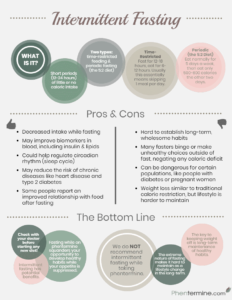Facts, Fiction, and Intermittent Fasting on Phentermine
Intermittent fasting has become recently popular in the weight loss community, including among phentermine users.
There are a couple of different types of intermittent fasting, but all of them involve extended periods of not eating. The basic logic behind these diets is that in our earlier days, humans went days at a time without food.
So, enthusiasts claim it’s actually a natural eating pattern that may prove biologically beneficial.
However, experts criticize the extreme nature of these diets and warn against using intermittent fasting in the presence of some health conditions.
Here we’ll discuss the basics of intermittent fasting and how it fits into your weight loss journey with phentermine.
Please note: If you are considering intermittent fasting, speak with your doctors and other health professionals first. They are best qualified to evaluate the safety and advisability of any new diet or exercise regimen in the presence of your specific medical conditions and treatments.
What is Intermittent Fasting?
Intermittent fasting comes in various forms. Scientists have known for many years that moderate caloric restriction improves health outcomes in adulthood.
The problem is that most people can’t (or at least won’t) voluntarily stop eating for extended periods of time. So, that’s where intermittent fasting comes in.
These plans are designed so that participants only have to fast some of the time while still reaping the health benefits of eating less.
The most popular fasts are the 5:2 diet and time-restricted feeding. We’ll talk a little more about each of these plans below.
There are also two groups of intermittent fasting that we won’t discuss. Some people practice alternate day fasting, but it isn’t as popular in the weight loss community (perhaps due to its impracticality), so we won’t delve into it here.
Also, people that fast for religious reasons (e.g., Muslims during Ramadan or Christians during Lent) are considered a separate category since they don’t restrict for health reasons.
The 5:2 Diet (Periodic Fasting)
The 5:2 diet involves splitting your seven-day week into five days of normal eating and two non-consecutive days of fasting. On fast days you only eat 25% of your recommended daily calories or about 500 calories for women and 600 calories for men.
Some studies show this method of fasting results in weight loss and may positively affect some biological markers. Still, little evidence shows that modified fasting is better than traditional caloric restriction — for weight loss or otherwise.
Time-Restricted Feeding

Another popular variation of intermittent fasting involves reducing the “feeding hours” each day.
Depending on their plan, followers fast for 12-18 hours per day and then consume all meals and snacks within the remaining 6-12 hours.
Usually, this means that fasters skip one meal and then eat the other two meals normally. Fans of this diet cite sleep cycle studies and “less time = less intake” to support the lifestyle change.
Extending your normal nighttime fast may benefit weight loss and blood cholesterol, but again, few controlled studies have proven the benefits of this diet in humans.
Benefits of Intermittent Fasting
Intermittent fasting’s rise to popularity hasn’t been without justification. There are some notable health benefits to this latest craze.
Most importantly for weight loss, if you eat for fewer hours per day, the assumption is that you will consume fewer calories.
As long as you’re eating enough to maintain basic functions, less intake means more weight loss. Unfortunately, dieters often feel like they’ve been good while abstaining, so they end up overeating or making unhealthy choices when eating.
This erases any caloric deficit established from fasting.
Intermittent fasting may also positively affect cholesterol, insulin, and inflammatory markers.
Studies show that fasting can lower overall blood lipids, which would in turn lower the risk of cardiovascular disease.
More specifically, this diet strategy may decrease LDL (bad cholesterol) and increase HDL (good cholesterol). It was also correlated with lower blood insulin levels but not lower blood glucose.
This means that restricting intake could help burn more abdominal fat.
Finally, short-term fasting may support more efficient cellular repair. Given the above changes, fasting may help prevent and/or treat chronic diseases, including diabetes and heart disease.
However, these claims should be interpreted with caution because most support for fasting still cites animal studies. So, further research is needed to confirm if intermittent fasting produces the same benefits in humans.
Finally, intermittent fasters themselves report that this practice helps combat cravings and improve their relationship with food.
One woman reported that a week of intermittent fasting helped her stop obsessing over food. Instead, she could devote her energy to more productive pursuits, knowing that she would eat when the time came.
Criticisms of Intermittent Fasting
Like most diet programs, intermittent fasting has also received its share of criticism. The most obvious downside of this plan is its extreme and hard-to-maintain nature.
Eliminating or severely restricting intake for a period of time may prove effective in the short term, but it is near impossible to maintain over the long term.
It’s also difficult to stick with this plan if you enjoy social gatherings with food or drink. So, even if you lose a lot of weight rapidly with fasting and phentermine, the associated and unsustainable lifestyle may facilitate rebound weight gain.
Also, studies show that intermittent fasting does not result in significantly more weight loss than traditional calorie restriction – even in the short term.
While the exact reason is unknown, this equality could be related to fasters’ tendency not to monitor the quantity or quality of intake as closely while eating.
Experts also express concern that fasters may deprive their bodies of the proper fuel needed to work out (some plans even go so far as to recommend shying away from hard exercise on fasting days).
So, reduced ability to exercise/burn calories may also play a role in fasters’ slowed weight loss.
Regardless of the reason, traditional restrictions and fasters experience similar weight loss results, but fasters have a higher drop-out rate. So, this is an argument for sticking with the traditional diet and exercise for weight loss.
Finally, intermittent fasting can be dangerous for some individuals. People with diabetes or hypoglycemia, or women who are pregnant or breastfeeding, should not adopt this diet plan.
Fasting may also prove problematic in the presence of other conditions. So, it’s very important to speak with a doctor before undertaking any new diet or exercise routine.
This is especially true if the plan represents a drastic departure from your current lifestyle, as intermittent fasting likely does.
The Bottom Line: Fasting and Phentermine
In short, intermittent fasting may have health benefits if you’re otherwise healthy and have the willpower to stick with it, but it’s not the right plan for everyone.
Studies show this lifestyle promotes short-term weight loss, may better biological markers like cholesterol, and could even help ward off select chronic diseases.
However, intermittent fasting isn’t shown to be any more effective than traditional caloric restriction. In fact, fasting likely proves less effective for long-term weight loss due to the higher “dropout” rate.
So, despite the current popularity of this diet, we still recommend traditional diets over fasting while taking phentermine. Eat balanced meals, practice portion control, and make physical activity part of your daily routine.
Even though these changes may seem less drastic than fasting (they are!), and the weight may not fall off as quickly, you are much more likely to keep the weight off if you create and maintain a healthy lifestyle.
The extreme schedules of intermittent fasting, in combination with the “eat anything” attitude during non-fasting periods, squanders patients’ opportunity to establish healthy, sustainable habits while taking phentermine.
Since this medication is only prescribed as a short-term weight loss aid, it’s critical that you take advantage of your twelve weeks of suppressed appetite and enhanced energy to establish long-term habits.
That being said, if you’re interested in intermittent fasting, make sure to check with your doctor before starting. He or she, with a team of medical professionals (including a dietitian), can help evaluate the safety and usefulness of intermittent fasting for you.
Your doctor will look at, among other things, your medical condition, current, and recent medications, and predicted tolerance to a new diet and/or exercise regimen.
Have you tried intermittent fasting? Or heard people talking about it? Let us know what you think in the comments section below!
Did you like the article?
Subscribe to our weekly newsletter and get our best weight loss tips straight to your inbox!










I’ve recently started intermittent fasting. I’ve been taking phentermine but since I’ve started IF, I’ve kinda spread out my phentermine usage to like every other day or at least the weekend when I don’t fast. So I don’t feel deprived. I’ve worked my way up to 18 hours and its like conquering the world to know I can do this! Phentermine helps!!! It’s a great tool!
Note to everyone: When you feel your stomach get hunger pangs, just think “Ok, this is awesome! My stomach is shrinking! I’m losing weight!” That’s a very positive mental saying on repeat and it keeps me encouraged!
IF and using phen has helped me learn what a craving is and what your body is needing. Example: One day, I had made some cranberry beans and cornbread… yes I’m from the country!! 🙂 WV girl to be exact.
I felt myself itching to eat some when I was supposed to be fasting. When I swallowed my beans, the bean broth, cornbread, and ham pieces my body lit up like a firework from my heart upwards and all over. That was my body saying THANK YOU! 🙂 a craving NEVER does that. A craving for me is like chocolate or junk food. I never experience physical and mental satisfaction with cravings. It’s a much more wholesome experience to fuel your body with something its needing.
I’m gonna keep doing what I’m doing, lost 1 lb last week and I am trying to stay mindful of what I eat during my feeding hours. I feel like I could do this my whole life. IF throughout the week, eat healthy, drink coffee and water, take a break on weekends and exercise every day somehow whether it be cleaning, walking, VR fitness apps, etc. now that’s sustainable if I feel like I can do it my whole life!
I’m also considering joining the Mediterranean bandwagon because its the healthiest diet on the planet and not as costly as keto, IMO. I love keto and its results but you get deprived after awhile. I know I’m rambling but I’m excited about this.
Hi Bethany,
Thank you for sharing! We are excited for you!
You are more than welcome to join our official Facebook support group so you can connect with other phentermine users today: https://www.facebook.com/groups/1069871763087734
Best regards,
Sarah, Phentermine.com
I started phentermine 2 weeks ago lost 2 pds the 1st week doing intermittent fasting and gained it back the 2nd week. I am exercising almost every day drinking 96 oz water have any suggestions I’m only taking half of my 37.5 mg should I be taking a whole one
Hi Kathy,
Maybe this can help: https://www.phentermine.com/phentermine-stopped-working/
You are also more than welcome to join our official Facebook support group so you can connect with other phentermine users today: https://www.facebook.com/groups/1069871763087734
Best regards,
Sarah, Phentermine.com
What you lost was water. Phentermine works if you use it to suppress your appetite to kick-start your new healthy lifestyle. I have taken it with Topiramate and it works, but it’s not meant to help you lose weight, only suppress your appetite long enough for you to possibly break bad eating habits and sugar addiction. I agree with the article, which is why intermittent fasting should be coupled with a keto diet, at least until your weight goal is reached. Look up “Dr. Jason Fung” on youtube. I found him by chance, and it has changed my life!
I am currently doing intermittent fasting, I eat within a 6 hour window and fast for 18 hours. I typically only eat once a day so it wasn’t hard to start this fasting. I’m 5″3 and 235 so according to the chart, I am extremely obese. I’m looking to add phentermine to the equation to see how it works.
phetermine is amazing in my opinion it really does what it’s supposed it was weird how I went from craving everything to nothing!
This article didn’t really touch on Pentermine, basically nothing! …and yet its in the title.
Waste of a read.
Agreed
I fast MWF and like how it has taught me what hunger really feels like, and it was easier to say no to food than negotiate with myself how much. It has also reduced my appetite, every day. I just started phen because while saxenda with fasting helped me lose 25 my insurance wouldn’t continue covering it. Eager to get the weight loss boost with phen…